Business Level Strategy: Generic Strategies and Kuwait's Advantage
VerifiedAdded on 2021/04/17
|9
|2074
|101
Report
AI Summary
This report analyzes business-level strategies and the factors contributing to national competitive advantage in Kuwait, based on Michael Porter's Diamond model. It explores the influence of firm strategy, structure, and rivalry; demand conditions; related and supporting industries; and factor endowments. The report also discusses how the Kuwaiti government can implement policies to enhance the competitiveness of local firms and attract multinational corporations. Furthermore, it examines strategies Kuwaiti firms can adopt to improve their capacity and create more employment opportunities, including adopting innovative technology, outsourcing, forming strategic alliances, and embracing continuous improvement. The report concludes by emphasizing the importance of adapting to the ever-changing global market conditions.
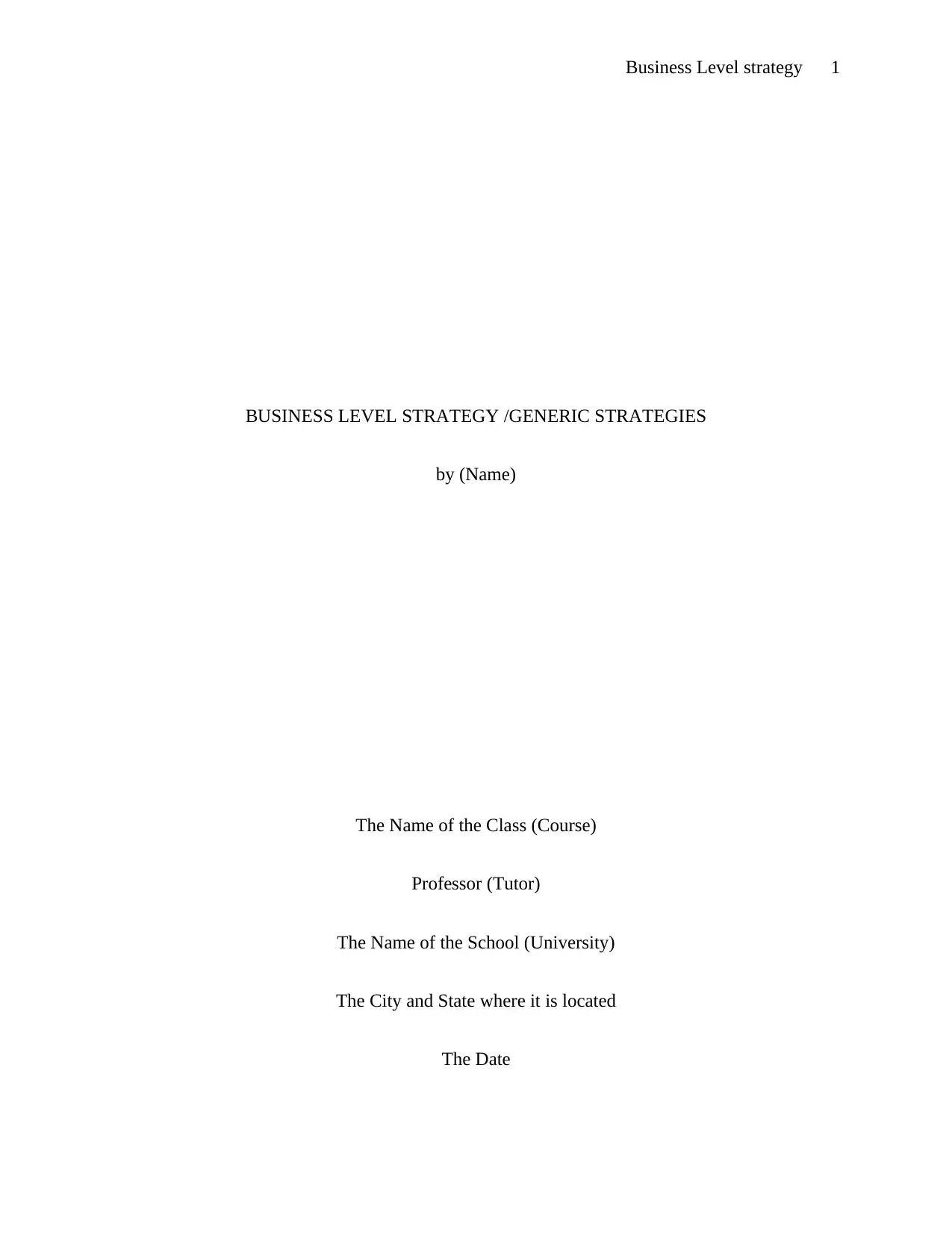
Business Level strategy 1
BUSINESS LEVEL STRATEGY /GENERIC STRATEGIES
by (Name)
The Name of the Class (Course)
Professor (Tutor)
The Name of the School (University)
The City and State where it is located
The Date
BUSINESS LEVEL STRATEGY /GENERIC STRATEGIES
by (Name)
The Name of the Class (Course)
Professor (Tutor)
The Name of the School (University)
The City and State where it is located
The Date
Paraphrase This Document
Need a fresh take? Get an instant paraphrase of this document with our AI Paraphraser
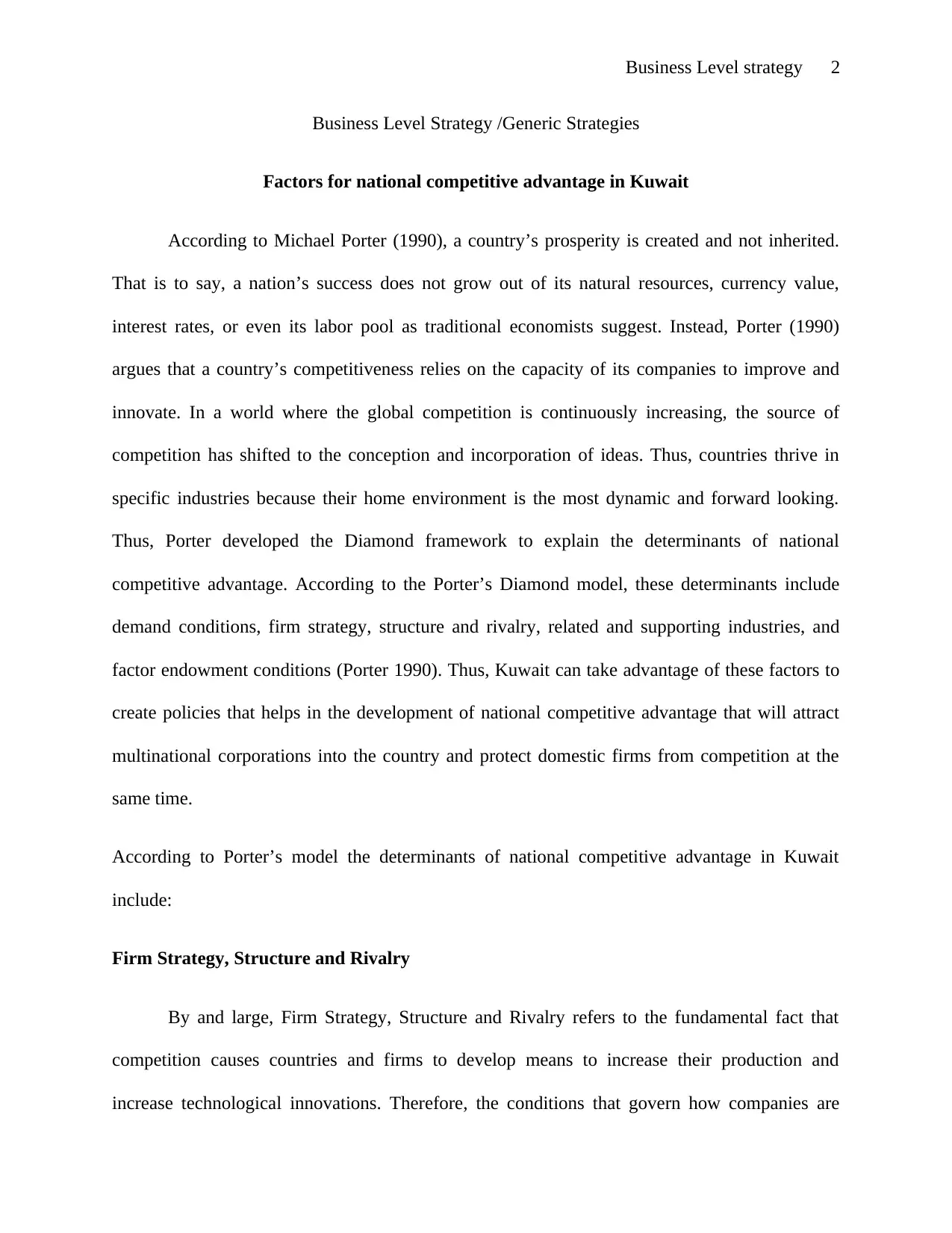
Business Level strategy 2
Business Level Strategy /Generic Strategies
Factors for national competitive advantage in Kuwait
According to Michael Porter (1990), a country’s prosperity is created and not inherited.
That is to say, a nation’s success does not grow out of its natural resources, currency value,
interest rates, or even its labor pool as traditional economists suggest. Instead, Porter (1990)
argues that a country’s competitiveness relies on the capacity of its companies to improve and
innovate. In a world where the global competition is continuously increasing, the source of
competition has shifted to the conception and incorporation of ideas. Thus, countries thrive in
specific industries because their home environment is the most dynamic and forward looking.
Thus, Porter developed the Diamond framework to explain the determinants of national
competitive advantage. According to the Porter’s Diamond model, these determinants include
demand conditions, firm strategy, structure and rivalry, related and supporting industries, and
factor endowment conditions (Porter 1990). Thus, Kuwait can take advantage of these factors to
create policies that helps in the development of national competitive advantage that will attract
multinational corporations into the country and protect domestic firms from competition at the
same time.
According to Porter’s model the determinants of national competitive advantage in Kuwait
include:
Firm Strategy, Structure and Rivalry
By and large, Firm Strategy, Structure and Rivalry refers to the fundamental fact that
competition causes countries and firms to develop means to increase their production and
increase technological innovations. Therefore, the conditions that govern how companies are
Business Level Strategy /Generic Strategies
Factors for national competitive advantage in Kuwait
According to Michael Porter (1990), a country’s prosperity is created and not inherited.
That is to say, a nation’s success does not grow out of its natural resources, currency value,
interest rates, or even its labor pool as traditional economists suggest. Instead, Porter (1990)
argues that a country’s competitiveness relies on the capacity of its companies to improve and
innovate. In a world where the global competition is continuously increasing, the source of
competition has shifted to the conception and incorporation of ideas. Thus, countries thrive in
specific industries because their home environment is the most dynamic and forward looking.
Thus, Porter developed the Diamond framework to explain the determinants of national
competitive advantage. According to the Porter’s Diamond model, these determinants include
demand conditions, firm strategy, structure and rivalry, related and supporting industries, and
factor endowment conditions (Porter 1990). Thus, Kuwait can take advantage of these factors to
create policies that helps in the development of national competitive advantage that will attract
multinational corporations into the country and protect domestic firms from competition at the
same time.
According to Porter’s model the determinants of national competitive advantage in Kuwait
include:
Firm Strategy, Structure and Rivalry
By and large, Firm Strategy, Structure and Rivalry refers to the fundamental fact that
competition causes countries and firms to develop means to increase their production and
increase technological innovations. Therefore, the conditions that govern how companies are
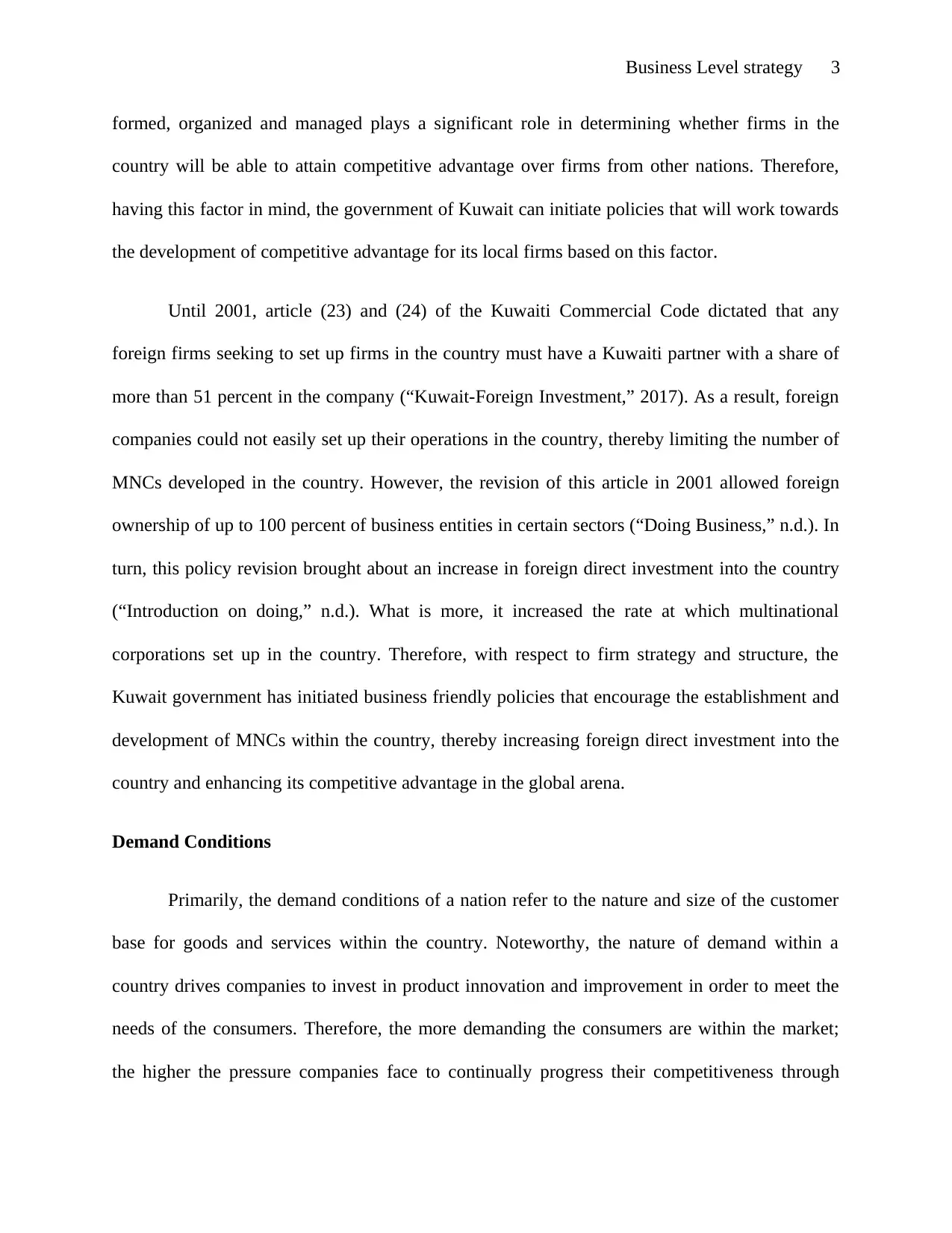
Business Level strategy 3
formed, organized and managed plays a significant role in determining whether firms in the
country will be able to attain competitive advantage over firms from other nations. Therefore,
having this factor in mind, the government of Kuwait can initiate policies that will work towards
the development of competitive advantage for its local firms based on this factor.
Until 2001, article (23) and (24) of the Kuwaiti Commercial Code dictated that any
foreign firms seeking to set up firms in the country must have a Kuwaiti partner with a share of
more than 51 percent in the company (“Kuwait-Foreign Investment,” 2017). As a result, foreign
companies could not easily set up their operations in the country, thereby limiting the number of
MNCs developed in the country. However, the revision of this article in 2001 allowed foreign
ownership of up to 100 percent of business entities in certain sectors (“Doing Business,” n.d.). In
turn, this policy revision brought about an increase in foreign direct investment into the country
(“Introduction on doing,” n.d.). What is more, it increased the rate at which multinational
corporations set up in the country. Therefore, with respect to firm strategy and structure, the
Kuwait government has initiated business friendly policies that encourage the establishment and
development of MNCs within the country, thereby increasing foreign direct investment into the
country and enhancing its competitive advantage in the global arena.
Demand Conditions
Primarily, the demand conditions of a nation refer to the nature and size of the customer
base for goods and services within the country. Noteworthy, the nature of demand within a
country drives companies to invest in product innovation and improvement in order to meet the
needs of the consumers. Therefore, the more demanding the consumers are within the market;
the higher the pressure companies face to continually progress their competitiveness through
formed, organized and managed plays a significant role in determining whether firms in the
country will be able to attain competitive advantage over firms from other nations. Therefore,
having this factor in mind, the government of Kuwait can initiate policies that will work towards
the development of competitive advantage for its local firms based on this factor.
Until 2001, article (23) and (24) of the Kuwaiti Commercial Code dictated that any
foreign firms seeking to set up firms in the country must have a Kuwaiti partner with a share of
more than 51 percent in the company (“Kuwait-Foreign Investment,” 2017). As a result, foreign
companies could not easily set up their operations in the country, thereby limiting the number of
MNCs developed in the country. However, the revision of this article in 2001 allowed foreign
ownership of up to 100 percent of business entities in certain sectors (“Doing Business,” n.d.). In
turn, this policy revision brought about an increase in foreign direct investment into the country
(“Introduction on doing,” n.d.). What is more, it increased the rate at which multinational
corporations set up in the country. Therefore, with respect to firm strategy and structure, the
Kuwait government has initiated business friendly policies that encourage the establishment and
development of MNCs within the country, thereby increasing foreign direct investment into the
country and enhancing its competitive advantage in the global arena.
Demand Conditions
Primarily, the demand conditions of a nation refer to the nature and size of the customer
base for goods and services within the country. Noteworthy, the nature of demand within a
country drives companies to invest in product innovation and improvement in order to meet the
needs of the consumers. Therefore, the more demanding the consumers are within the market;
the higher the pressure companies face to continually progress their competitiveness through
⊘ This is a preview!⊘
Do you want full access?
Subscribe today to unlock all pages.

Trusted by 1+ million students worldwide
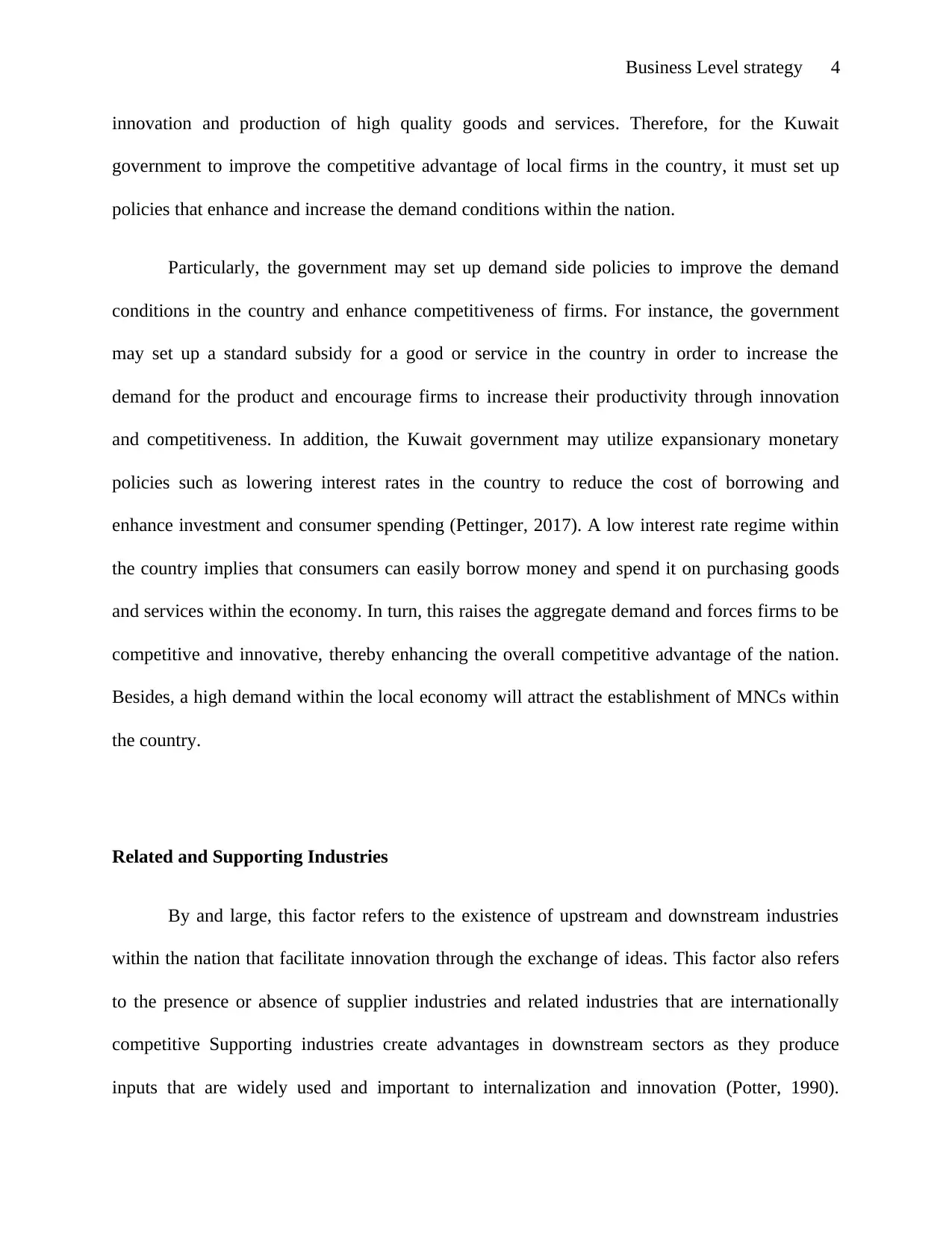
Business Level strategy 4
innovation and production of high quality goods and services. Therefore, for the Kuwait
government to improve the competitive advantage of local firms in the country, it must set up
policies that enhance and increase the demand conditions within the nation.
Particularly, the government may set up demand side policies to improve the demand
conditions in the country and enhance competitiveness of firms. For instance, the government
may set up a standard subsidy for a good or service in the country in order to increase the
demand for the product and encourage firms to increase their productivity through innovation
and competitiveness. In addition, the Kuwait government may utilize expansionary monetary
policies such as lowering interest rates in the country to reduce the cost of borrowing and
enhance investment and consumer spending (Pettinger, 2017). A low interest rate regime within
the country implies that consumers can easily borrow money and spend it on purchasing goods
and services within the economy. In turn, this raises the aggregate demand and forces firms to be
competitive and innovative, thereby enhancing the overall competitive advantage of the nation.
Besides, a high demand within the local economy will attract the establishment of MNCs within
the country.
Related and Supporting Industries
By and large, this factor refers to the existence of upstream and downstream industries
within the nation that facilitate innovation through the exchange of ideas. This factor also refers
to the presence or absence of supplier industries and related industries that are internationally
competitive Supporting industries create advantages in downstream sectors as they produce
inputs that are widely used and important to internalization and innovation (Potter, 1990).
innovation and production of high quality goods and services. Therefore, for the Kuwait
government to improve the competitive advantage of local firms in the country, it must set up
policies that enhance and increase the demand conditions within the nation.
Particularly, the government may set up demand side policies to improve the demand
conditions in the country and enhance competitiveness of firms. For instance, the government
may set up a standard subsidy for a good or service in the country in order to increase the
demand for the product and encourage firms to increase their productivity through innovation
and competitiveness. In addition, the Kuwait government may utilize expansionary monetary
policies such as lowering interest rates in the country to reduce the cost of borrowing and
enhance investment and consumer spending (Pettinger, 2017). A low interest rate regime within
the country implies that consumers can easily borrow money and spend it on purchasing goods
and services within the economy. In turn, this raises the aggregate demand and forces firms to be
competitive and innovative, thereby enhancing the overall competitive advantage of the nation.
Besides, a high demand within the local economy will attract the establishment of MNCs within
the country.
Related and Supporting Industries
By and large, this factor refers to the existence of upstream and downstream industries
within the nation that facilitate innovation through the exchange of ideas. This factor also refers
to the presence or absence of supplier industries and related industries that are internationally
competitive Supporting industries create advantages in downstream sectors as they produce
inputs that are widely used and important to internalization and innovation (Potter, 1990).
Paraphrase This Document
Need a fresh take? Get an instant paraphrase of this document with our AI Paraphraser
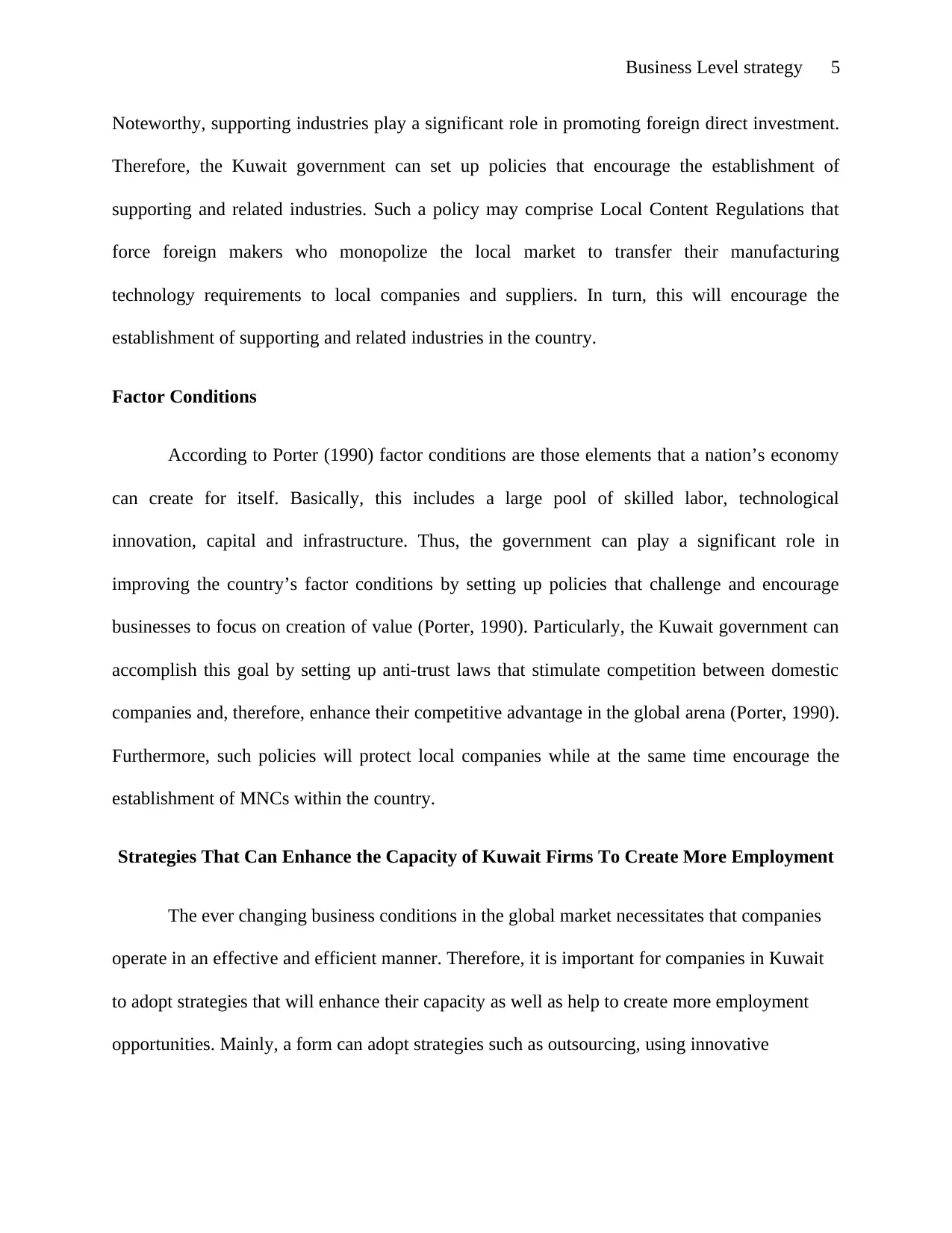
Business Level strategy 5
Noteworthy, supporting industries play a significant role in promoting foreign direct investment.
Therefore, the Kuwait government can set up policies that encourage the establishment of
supporting and related industries. Such a policy may comprise Local Content Regulations that
force foreign makers who monopolize the local market to transfer their manufacturing
technology requirements to local companies and suppliers. In turn, this will encourage the
establishment of supporting and related industries in the country.
Factor Conditions
According to Porter (1990) factor conditions are those elements that a nation’s economy
can create for itself. Basically, this includes a large pool of skilled labor, technological
innovation, capital and infrastructure. Thus, the government can play a significant role in
improving the country’s factor conditions by setting up policies that challenge and encourage
businesses to focus on creation of value (Porter, 1990). Particularly, the Kuwait government can
accomplish this goal by setting up anti-trust laws that stimulate competition between domestic
companies and, therefore, enhance their competitive advantage in the global arena (Porter, 1990).
Furthermore, such policies will protect local companies while at the same time encourage the
establishment of MNCs within the country.
Strategies That Can Enhance the Capacity of Kuwait Firms To Create More Employment
The ever changing business conditions in the global market necessitates that companies
operate in an effective and efficient manner. Therefore, it is important for companies in Kuwait
to adopt strategies that will enhance their capacity as well as help to create more employment
opportunities. Mainly, a form can adopt strategies such as outsourcing, using innovative
Noteworthy, supporting industries play a significant role in promoting foreign direct investment.
Therefore, the Kuwait government can set up policies that encourage the establishment of
supporting and related industries. Such a policy may comprise Local Content Regulations that
force foreign makers who monopolize the local market to transfer their manufacturing
technology requirements to local companies and suppliers. In turn, this will encourage the
establishment of supporting and related industries in the country.
Factor Conditions
According to Porter (1990) factor conditions are those elements that a nation’s economy
can create for itself. Basically, this includes a large pool of skilled labor, technological
innovation, capital and infrastructure. Thus, the government can play a significant role in
improving the country’s factor conditions by setting up policies that challenge and encourage
businesses to focus on creation of value (Porter, 1990). Particularly, the Kuwait government can
accomplish this goal by setting up anti-trust laws that stimulate competition between domestic
companies and, therefore, enhance their competitive advantage in the global arena (Porter, 1990).
Furthermore, such policies will protect local companies while at the same time encourage the
establishment of MNCs within the country.
Strategies That Can Enhance the Capacity of Kuwait Firms To Create More Employment
The ever changing business conditions in the global market necessitates that companies
operate in an effective and efficient manner. Therefore, it is important for companies in Kuwait
to adopt strategies that will enhance their capacity as well as help to create more employment
opportunities. Mainly, a form can adopt strategies such as outsourcing, using innovative
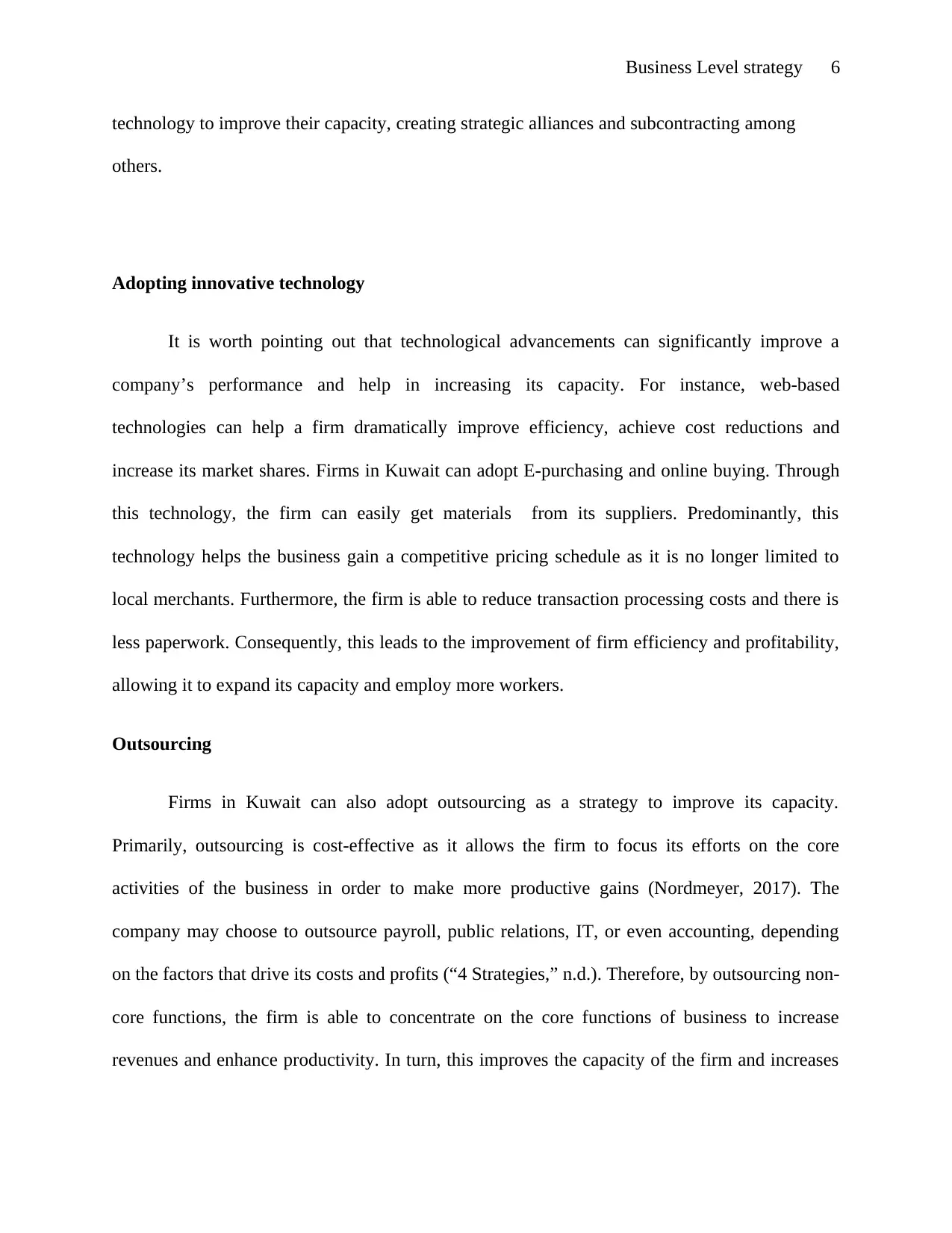
Business Level strategy 6
technology to improve their capacity, creating strategic alliances and subcontracting among
others.
Adopting innovative technology
It is worth pointing out that technological advancements can significantly improve a
company’s performance and help in increasing its capacity. For instance, web-based
technologies can help a firm dramatically improve efficiency, achieve cost reductions and
increase its market shares. Firms in Kuwait can adopt E-purchasing and online buying. Through
this technology, the firm can easily get materials from its suppliers. Predominantly, this
technology helps the business gain a competitive pricing schedule as it is no longer limited to
local merchants. Furthermore, the firm is able to reduce transaction processing costs and there is
less paperwork. Consequently, this leads to the improvement of firm efficiency and profitability,
allowing it to expand its capacity and employ more workers.
Outsourcing
Firms in Kuwait can also adopt outsourcing as a strategy to improve its capacity.
Primarily, outsourcing is cost-effective as it allows the firm to focus its efforts on the core
activities of the business in order to make more productive gains (Nordmeyer, 2017). The
company may choose to outsource payroll, public relations, IT, or even accounting, depending
on the factors that drive its costs and profits (“4 Strategies,” n.d.). Therefore, by outsourcing non-
core functions, the firm is able to concentrate on the core functions of business to increase
revenues and enhance productivity. In turn, this improves the capacity of the firm and increases
technology to improve their capacity, creating strategic alliances and subcontracting among
others.
Adopting innovative technology
It is worth pointing out that technological advancements can significantly improve a
company’s performance and help in increasing its capacity. For instance, web-based
technologies can help a firm dramatically improve efficiency, achieve cost reductions and
increase its market shares. Firms in Kuwait can adopt E-purchasing and online buying. Through
this technology, the firm can easily get materials from its suppliers. Predominantly, this
technology helps the business gain a competitive pricing schedule as it is no longer limited to
local merchants. Furthermore, the firm is able to reduce transaction processing costs and there is
less paperwork. Consequently, this leads to the improvement of firm efficiency and profitability,
allowing it to expand its capacity and employ more workers.
Outsourcing
Firms in Kuwait can also adopt outsourcing as a strategy to improve its capacity.
Primarily, outsourcing is cost-effective as it allows the firm to focus its efforts on the core
activities of the business in order to make more productive gains (Nordmeyer, 2017). The
company may choose to outsource payroll, public relations, IT, or even accounting, depending
on the factors that drive its costs and profits (“4 Strategies,” n.d.). Therefore, by outsourcing non-
core functions, the firm is able to concentrate on the core functions of business to increase
revenues and enhance productivity. In turn, this improves the capacity of the firm and increases
⊘ This is a preview!⊘
Do you want full access?
Subscribe today to unlock all pages.

Trusted by 1+ million students worldwide
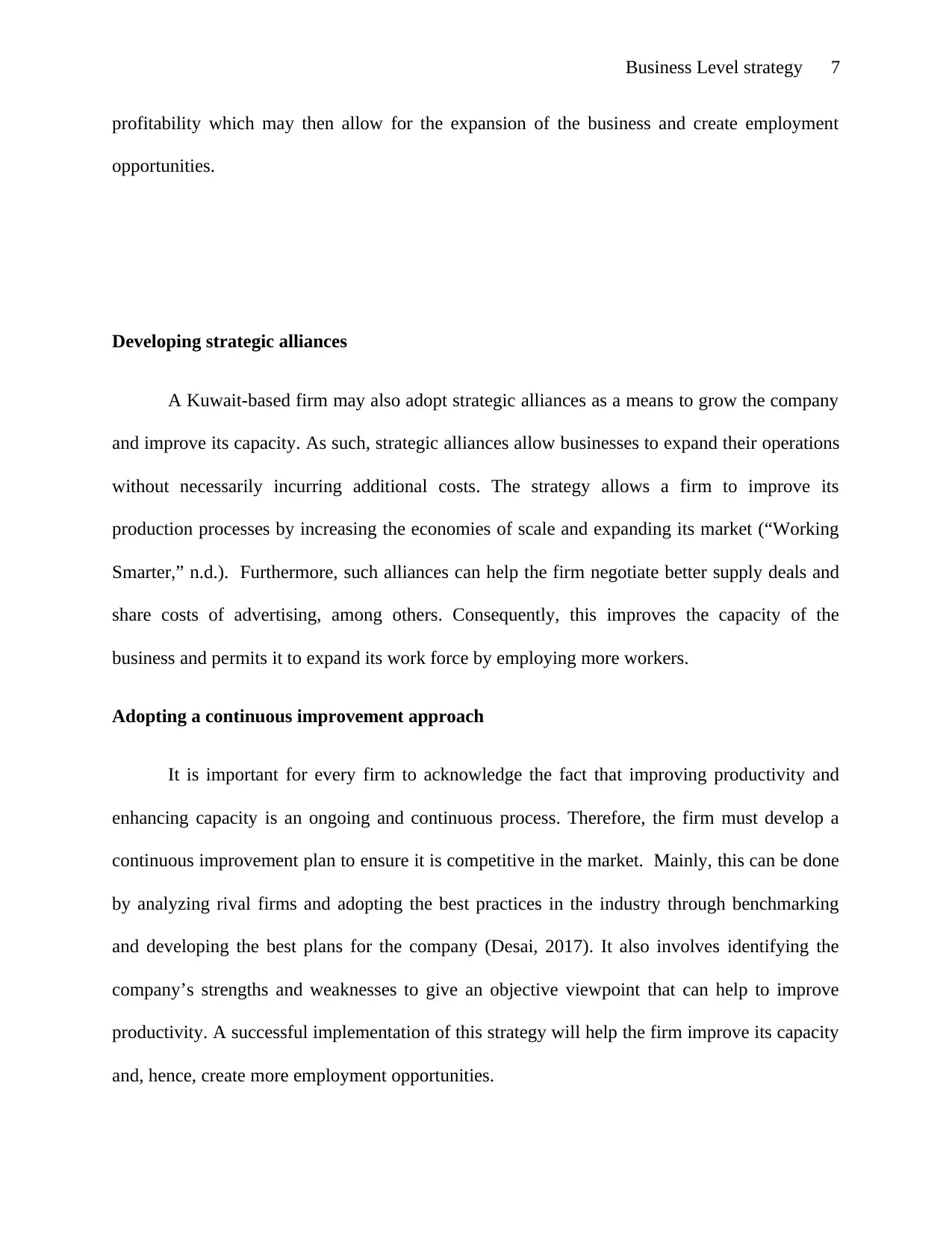
Business Level strategy 7
profitability which may then allow for the expansion of the business and create employment
opportunities.
Developing strategic alliances
A Kuwait-based firm may also adopt strategic alliances as a means to grow the company
and improve its capacity. As such, strategic alliances allow businesses to expand their operations
without necessarily incurring additional costs. The strategy allows a firm to improve its
production processes by increasing the economies of scale and expanding its market (“Working
Smarter,” n.d.). Furthermore, such alliances can help the firm negotiate better supply deals and
share costs of advertising, among others. Consequently, this improves the capacity of the
business and permits it to expand its work force by employing more workers.
Adopting a continuous improvement approach
It is important for every firm to acknowledge the fact that improving productivity and
enhancing capacity is an ongoing and continuous process. Therefore, the firm must develop a
continuous improvement plan to ensure it is competitive in the market. Mainly, this can be done
by analyzing rival firms and adopting the best practices in the industry through benchmarking
and developing the best plans for the company (Desai, 2017). It also involves identifying the
company’s strengths and weaknesses to give an objective viewpoint that can help to improve
productivity. A successful implementation of this strategy will help the firm improve its capacity
and, hence, create more employment opportunities.
profitability which may then allow for the expansion of the business and create employment
opportunities.
Developing strategic alliances
A Kuwait-based firm may also adopt strategic alliances as a means to grow the company
and improve its capacity. As such, strategic alliances allow businesses to expand their operations
without necessarily incurring additional costs. The strategy allows a firm to improve its
production processes by increasing the economies of scale and expanding its market (“Working
Smarter,” n.d.). Furthermore, such alliances can help the firm negotiate better supply deals and
share costs of advertising, among others. Consequently, this improves the capacity of the
business and permits it to expand its work force by employing more workers.
Adopting a continuous improvement approach
It is important for every firm to acknowledge the fact that improving productivity and
enhancing capacity is an ongoing and continuous process. Therefore, the firm must develop a
continuous improvement plan to ensure it is competitive in the market. Mainly, this can be done
by analyzing rival firms and adopting the best practices in the industry through benchmarking
and developing the best plans for the company (Desai, 2017). It also involves identifying the
company’s strengths and weaknesses to give an objective viewpoint that can help to improve
productivity. A successful implementation of this strategy will help the firm improve its capacity
and, hence, create more employment opportunities.
Paraphrase This Document
Need a fresh take? Get an instant paraphrase of this document with our AI Paraphraser
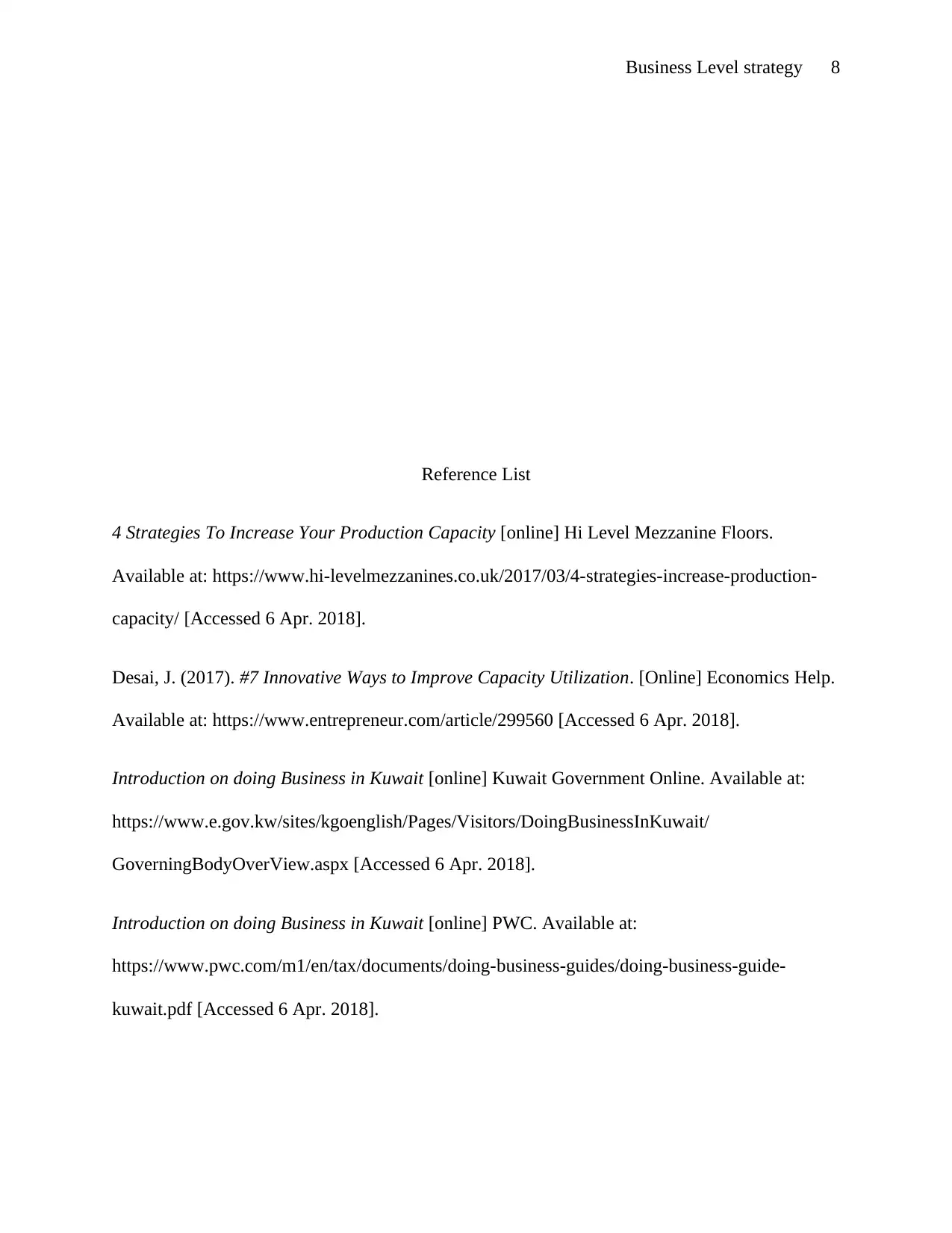
Business Level strategy 8
Reference List
4 Strategies To Increase Your Production Capacity [online] Hi Level Mezzanine Floors.
Available at: https://www.hi-levelmezzanines.co.uk/2017/03/4-strategies-increase-production-
capacity/ [Accessed 6 Apr. 2018].
Desai, J. (2017). #7 Innovative Ways to Improve Capacity Utilization. [Online] Economics Help.
Available at: https://www.entrepreneur.com/article/299560 [Accessed 6 Apr. 2018].
Introduction on doing Business in Kuwait [online] Kuwait Government Online. Available at:
https://www.e.gov.kw/sites/kgoenglish/Pages/Visitors/DoingBusinessInKuwait/
GoverningBodyOverView.aspx [Accessed 6 Apr. 2018].
Introduction on doing Business in Kuwait [online] PWC. Available at:
https://www.pwc.com/m1/en/tax/documents/doing-business-guides/doing-business-guide-
kuwait.pdf [Accessed 6 Apr. 2018].
Reference List
4 Strategies To Increase Your Production Capacity [online] Hi Level Mezzanine Floors.
Available at: https://www.hi-levelmezzanines.co.uk/2017/03/4-strategies-increase-production-
capacity/ [Accessed 6 Apr. 2018].
Desai, J. (2017). #7 Innovative Ways to Improve Capacity Utilization. [Online] Economics Help.
Available at: https://www.entrepreneur.com/article/299560 [Accessed 6 Apr. 2018].
Introduction on doing Business in Kuwait [online] Kuwait Government Online. Available at:
https://www.e.gov.kw/sites/kgoenglish/Pages/Visitors/DoingBusinessInKuwait/
GoverningBodyOverView.aspx [Accessed 6 Apr. 2018].
Introduction on doing Business in Kuwait [online] PWC. Available at:
https://www.pwc.com/m1/en/tax/documents/doing-business-guides/doing-business-guide-
kuwait.pdf [Accessed 6 Apr. 2018].
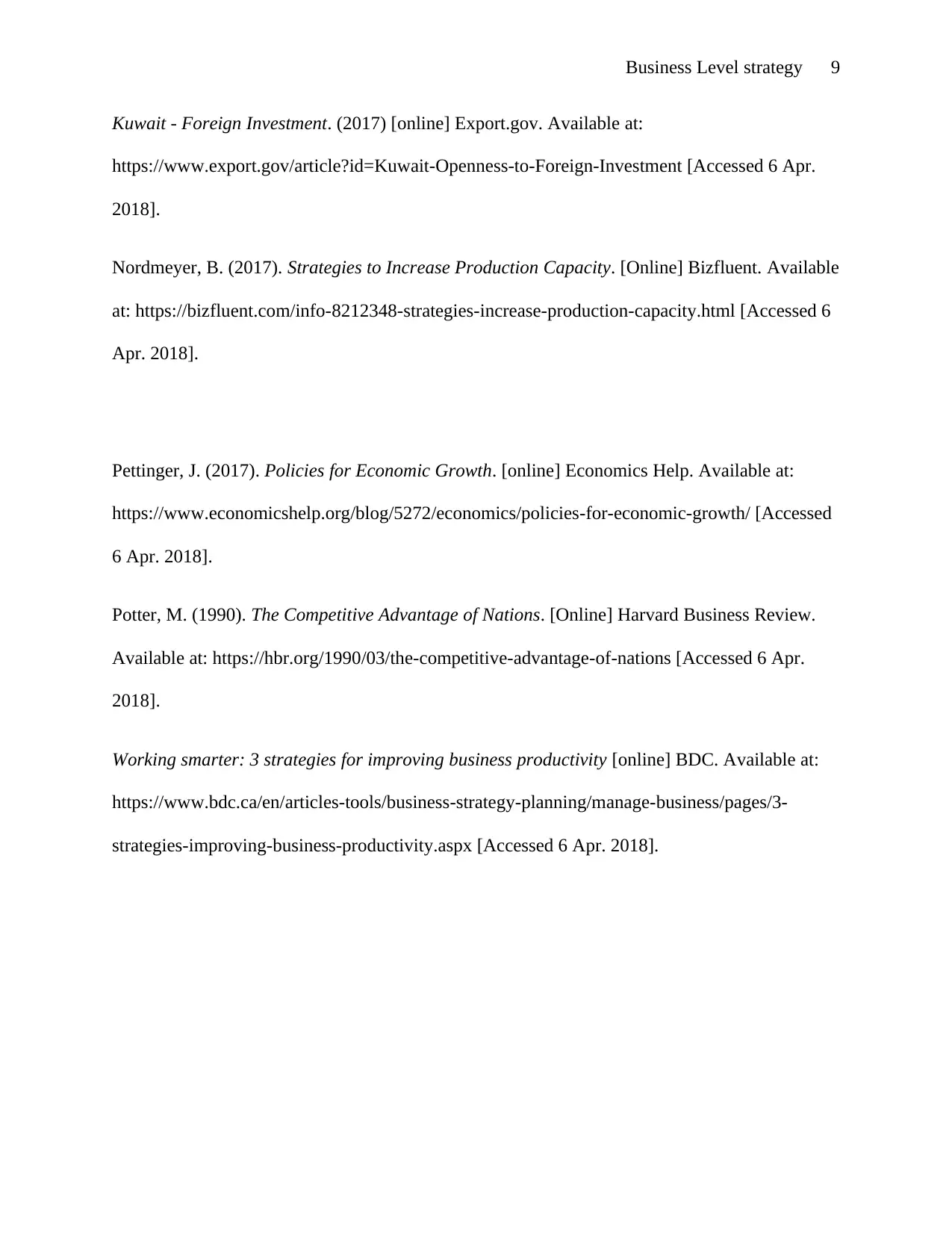
Business Level strategy 9
Kuwait - Foreign Investment. (2017) [online] Export.gov. Available at:
https://www.export.gov/article?id=Kuwait-Openness-to-Foreign-Investment [Accessed 6 Apr.
2018].
Nordmeyer, B. (2017). Strategies to Increase Production Capacity. [Online] Bizfluent. Available
at: https://bizfluent.com/info-8212348-strategies-increase-production-capacity.html [Accessed 6
Apr. 2018].
Pettinger, J. (2017). Policies for Economic Growth. [online] Economics Help. Available at:
https://www.economicshelp.org/blog/5272/economics/policies-for-economic-growth/ [Accessed
6 Apr. 2018].
Potter, M. (1990). The Competitive Advantage of Nations. [Online] Harvard Business Review.
Available at: https://hbr.org/1990/03/the-competitive-advantage-of-nations [Accessed 6 Apr.
2018].
Working smarter: 3 strategies for improving business productivity [online] BDC. Available at:
https://www.bdc.ca/en/articles-tools/business-strategy-planning/manage-business/pages/3-
strategies-improving-business-productivity.aspx [Accessed 6 Apr. 2018].
Kuwait - Foreign Investment. (2017) [online] Export.gov. Available at:
https://www.export.gov/article?id=Kuwait-Openness-to-Foreign-Investment [Accessed 6 Apr.
2018].
Nordmeyer, B. (2017). Strategies to Increase Production Capacity. [Online] Bizfluent. Available
at: https://bizfluent.com/info-8212348-strategies-increase-production-capacity.html [Accessed 6
Apr. 2018].
Pettinger, J. (2017). Policies for Economic Growth. [online] Economics Help. Available at:
https://www.economicshelp.org/blog/5272/economics/policies-for-economic-growth/ [Accessed
6 Apr. 2018].
Potter, M. (1990). The Competitive Advantage of Nations. [Online] Harvard Business Review.
Available at: https://hbr.org/1990/03/the-competitive-advantage-of-nations [Accessed 6 Apr.
2018].
Working smarter: 3 strategies for improving business productivity [online] BDC. Available at:
https://www.bdc.ca/en/articles-tools/business-strategy-planning/manage-business/pages/3-
strategies-improving-business-productivity.aspx [Accessed 6 Apr. 2018].
⊘ This is a preview!⊘
Do you want full access?
Subscribe today to unlock all pages.

Trusted by 1+ million students worldwide
1 out of 9
Related Documents
Your All-in-One AI-Powered Toolkit for Academic Success.
+13062052269
info@desklib.com
Available 24*7 on WhatsApp / Email
![[object Object]](/_next/static/media/star-bottom.7253800d.svg)
Unlock your academic potential
Copyright © 2020–2026 A2Z Services. All Rights Reserved. Developed and managed by ZUCOL.





